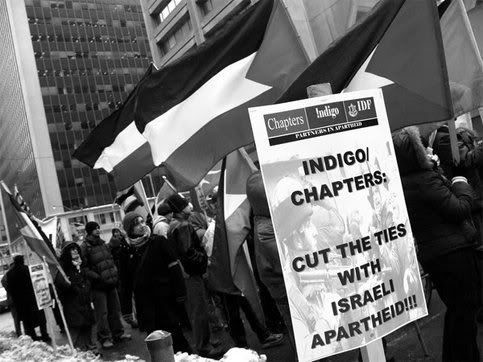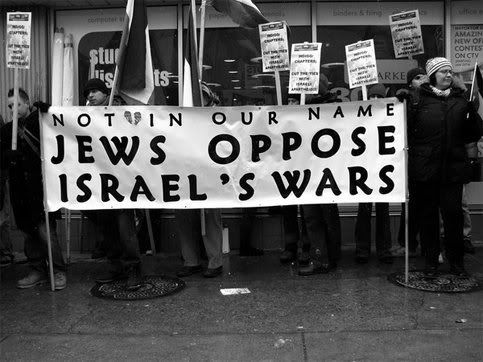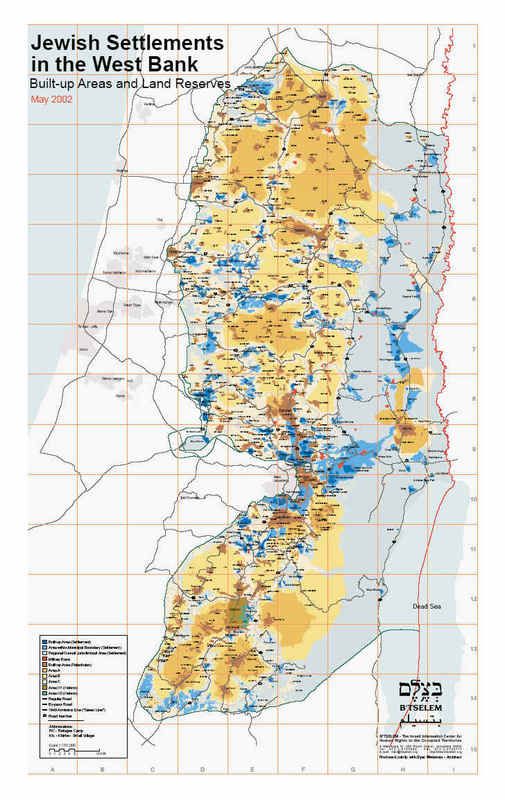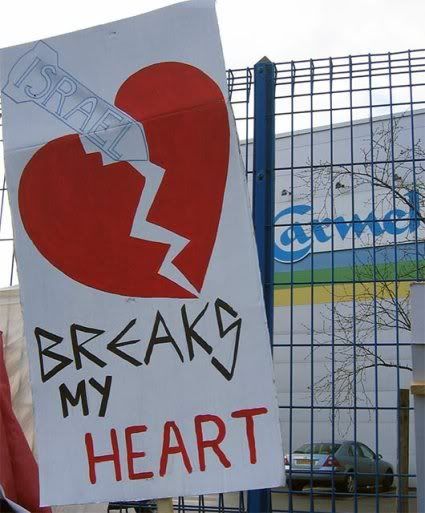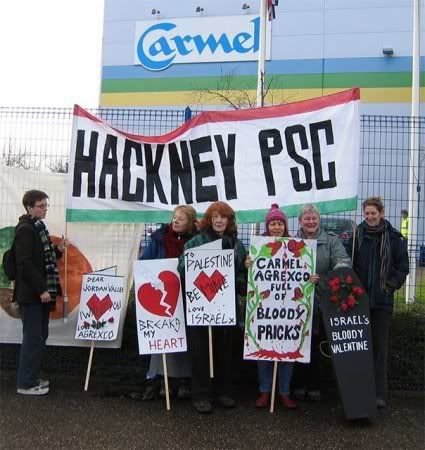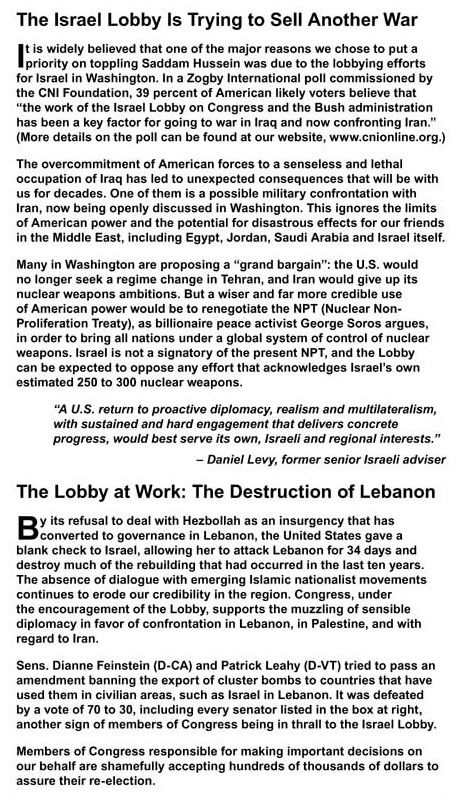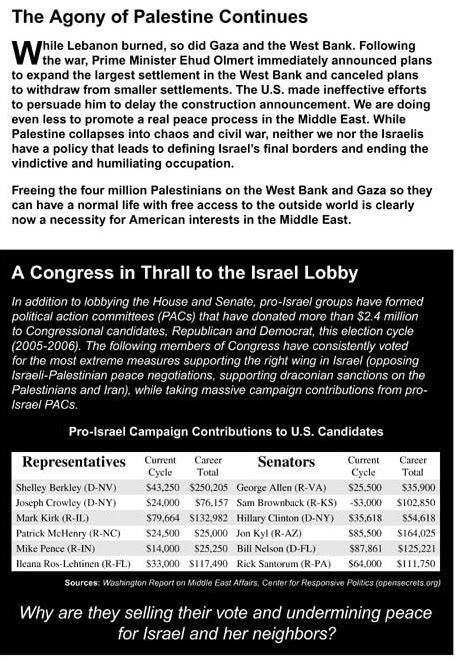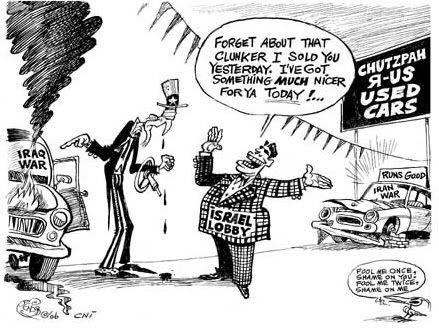Not all but most Americans are completely unaware of Israel’s broad and well-orchestrated campaign to keep them ignorant of the truth about the Israeli-Palestinian conflict. Early last year, a documentary made it to Internet outlets, which provided startling revelations of just how ignorant Americans are being kept about the nature of Israel’s military occupation of the West Bank. Its obvious purpose to support the colonization of the West Bank in order to achieve the religious/historical Zionist dream of a Greater Israel is now clear to everyone. If completed, such a project would essentially nullify any possibility for a sovereign Palestinian state. A Palestinian state in such a circumstance would be nothing more than a South African style Bantustan.
In the documentary, Peace, Propaganda, & The Promised Land, featuring the likes of such people as Noam Chomsky, Robert Fisk, Arik Ackerman (founder of Rabbis for Human Rights), and many others, that story was told. It’s introduction on Google-Video read,
Peace, Propaganda & the Promised Land provides a striking comparison of U.S. and international media coverage of the crisis in the Middle East, zeroing in on how structural distortions in U.S. coverage have reinforced false perceptions of the Israeli-Palestinian conflict. This pivotal documentary exposes how the foreign policy interests of American political elites–oil, and a need to have a secure military base in the region, among others–work in combination with Israeli public relations strategies to exercise a powerful influence over how news from the region is reported.
Through the voices of scholars, media critics, peace activists, religious figures, and Middle East experts, Peace, Propaganda & the Promised Land carefully analyzes and explains how–through the use of language, framing and decontextualizing–the Israeli occupation of the West Bank and Gaza remains hidden in the news media, and Israeli colonization of the occupied territories appears to be a defensive move rather than an offensive one. The documentary also explores the ways that U.S. journalists, for reasons ranging from intimidation to a lack of thorough investigation, have become complicit in carrying out Israel’s PR campaign. At its core, the documentary raises questions about the ethics and role of journalism, and the relationship between media and politics.
Peace, Propaganda, & The Promised Land played to over 900,000 viewers on Google-Video before moving to YouTube, but with all outlets and versions considered, it has probably experienced over a million views in the past 10 months since release.
http://www.youtube.com/watch?v=UldEpr0HCEU
If censoring news outlets and redefining the language of conflict were not enough, strong grassroots efforts to plug leaks has also been underway in recent years, with new Israeli media projects focused on the eyes and ears of America to counteract any truth that might break through this critical foreign Maginot line. Until recently, because the Europeans and peoples in other parts of the world have not been subjected to news censorship and propaganda, their awareness and scrutiny of Israel’s occupation of the Palestinians, and thus, their criticism, has been amplified and their involvement in the international peace movement more vigorous. Foreign politicians have also not been much subjected to lobby efforts the likes of the AIPAC/ZOA/Likudnik coalition, representing the right wing Zionist position.
The Israel Project (TIP) describes itself as an “international non-profit organization devoted to educating the press and the public about Israel while promoting security, freedom and peace. The Israel Project provides journalists, leaders and opinion-makers accurate information about Israel. The Israel Project is not related to any government or government agency.”
http://www.theisraelproject.org/site/c.hsJPK0PIJpH/b.672581/k.CB99/Home.htm
The Israel Project will gladly tell us about Israel’s peace efforts, e.g., “Israeli withdrawals in the name of peace (Gaza and Lebanon),” but nothing at all about the continuing occupation and confiscation of Palestinian lands, along with the building and reinforcement of so-called settlements, Israeli-only villages, towns, and cities, and the extensions of Israeli-only roads and highways in the West Bank. The site no longer advertises the availability of Frank Luntz’s consultation, which was completed in 2004. Frank Luntz is the well-known Republican pollster, who invented the “death tax” and other neat deceptions. Luntz’s consultation, which is replete with lies and half-truths, is intended to reinforce and enlarge Israel’s propaganda effort in America and to help curb the spread of knowledge that is transforming the thinking of American university and college students. Student are progressively learning the truth about Israel from leaky sources, such as the European and Middle East press, as opposed to being mesmerized by the censored US media.
http://www.dailykos.com/story/2006/9/13/94033/2608
Here is a sample of Frank Luntz’s consultative subterfuge:
Spokespersons for Israel should always emphasize that they’re for peace. “The only way for Israel to evoke sympathy is to be the side working hardest for peace. The best case for Israel is to demonstrate that she is willing to go twice as far as her neighbors to establish peace.”
“It’s not just a conflict, it’s culture.” Blame alleged defects in Palestinian culture, such as anti-Israel incitement in the media and schools, a culture of martyrdom, etc. “But be careful – do not directly accuse the Palestinians of depravity. Simply show it, and let the images and words speak for themselves. Let the Palestinians speak for themselves. Show them Palestinian TV, unedited, without voiceover.”
Emphasize Palestinian rejection of Barak’s supposedly generous offer at Camp David in 2000. There is no more powerful tool in driving home Israel’s commitment to a peaceful solution [!!] than the Camp David offer (diarist’s note: Frank said “supposedly” because he undoubtedly knows that Barak was unable to remove the over 150 Israeli villages, towns, and small cities, interconnected with Israel by Israeli-only roads and highways, located in the West Bank and Gaza.).
Emphasize the locations of suicide bombings, especially places that graduate students can imagine themselves congregating [at] – Sbarro pizza restaurant, Dolphinarium disco, Hebrew University cafeteria (diarist’s note: this turns out to be the most repeated half-truth by right wing bloggers, who avoid talking about the many killings of Palestinian civilians, especially children, that preceded these bombings or about the military occupation that is at the root of it all.).
They’re disputed territories, not occupied territories (diarist’s note: contrary to international law and UN Resolutions).
They’re Arabs, not Palestinians. The term ‘Palestinians’ evokes images of refugee camps, victims and oppression. ‘Arab’ says wealth, oil and Islam (diarist’s note: Palestinians are Arabs, the Arabs of Palestine.).
Blame the Wall and the perpetuation of the conflict in general on Hamas and Islamic Jihad. America’s future leaders hate Hamas and Islamic Jihad. If there is such a thing as a magic bullet, this is it.
START EARLY. The earlier in life future leaders hear about Israel in a positive vein, the less likely they are to support the Palestinian position as they grow older. Those kids who first heard of Israel through Biblical references when they were five, six, or seven grew up to appreciate the spiritual importance of the Jewish State [!!].
Every Rabbi, Jewish community leader, and knowledgeable pro-Israel activist in America should commit to visiting parochial schools and Sunday schools to talk about Israel to as many children as possible. Israel has developed a powerful alliance with many Christian organizations, and these alliances need to be utilized to provide teaching opportunities within the church itself (Diarist note: Frank must here be talking about the Evangelicals seeking the Rapture, but any religious school is intended to be targeted.).
In other words, let’s get rabbis involved and begin indoctrinating American children from an early age.
Added to the Israel Project effort to propagandize Americans is another one called GIYUS.
GIYUS.ORG is an unabashed Israeli propaganda website focused on soliciting the services of computer savvy bloggers to distribute (by download) a program called MEGAPHONE, that is essentially an RSS feed so that interested parties can keep track of where on the web they need immediately to go so they can vote in polls and comment in blogs and forums to bolster support for Israel in its various problem areas. The GIYUS site itself is also a useful resource to bloggers in need of “talking points” to counteract any apparently anti-Israel assertion, whether true or not. Needless to say, dangerous left-wing blogs have undoubtedly been invaded by GIYUS volunteers.
A talking point for both the Israel Project and GIYUS is a false assertion or half-truth intended to convince people of some distorted reality as readily evident from Frank Luntz’s consultation points and the “talking points” section of GIYUS, where bloggers can obtain tips to counteract, what essentially are simple truths about Israel’s West Bank effort. Simple truths about the Israeli-Palestinian conflict often turn out to be the most dangerous kinds of antiIsraeli media leaks. There is little question that GIYUS operatives have infiltrated left-wing political blogs. To date they have practically shut down the Democratic Underground, where only proIsrael contributions pass censorship, and at the world’s largest left wing blog, Daily Kos, which purports to be left of AIPAC/DLC/Likudnik bias, right wing proIsrael operatives, logically of GIYUS origin, congregate freely.
Electronic Intifada’s Israel Lobby Watch section offers news about the ongoing tactics of pro-Israel lobby organizations around the world and analyses attempts to rewrite history with an Israeli narrative, international reactions to pressure, and the effect of the lobby’s work on domestic political life.
http://electronicintifada.net/v2/israellobbywatch.shtml
Let me close with some recent reports from this section of EI published within the past two months. I will quote a brief introduction and provide a link to them. Most demonstrate how the Israeli censorship/propaganda effort has reaching down to the American street, affecting what people like you and me are not permitted to hear from media and non-media resources.
Subcommittee hosts anti-Palestinian threesome posted by Michael F. Brown on February 14, 2007
http://electronicintifada.net/v2/article6555.shtml
Hubris leads directly to disrespect. Back in power for just a handful of weeks, Rep. Gary Ackerman, the Chairman of the Subcommittee on the Middle East and South Asia, is already displaying his disregard for the Peace Movement, Arab Americans, Muslim Americans, the unfairly maligned progressive Jewish community, and, well, generally anyone who favors a fair debate on the Israeli-Palestinian conflict.
No such debate will occur on Valentine’s Day when Ackerman’s Subcommittee hosts a stacked and biased witness list. There to present will be David Makovsky, Director of the Project on the Middle East Peace Process at the Washington Institute for Near East Policy (WINEP), Martin S. Indyk, Director of the Saban Center for Middle East Policy at the Brookings Institution, and the infamous Daniel Pipes, Director of the Middle East Forum. The latter is akin to a modern-day McCarthy with his close ties to Campus Watch and its classroom monitoring work.
(snip)
For years both Makovsky and Indyk have been obstructionists on advancing Palestinian rights and freedom. More recently, Makovsky defended the illegal separation barrier Israel is building in the West Bank when he testified on the Hill in 2004 alongside his WINEP colleague, Amb. Dennis Ross. Indyk recently hosted Israel’s leading racist, Israeli Deputy Prime Minister Avigdor Lieberman, who was a featured speaker at a Saban conference in Washington, DC. While an invitation does not necessarily constitute endorsement, it did much in this instance to bolster Lieberman as a legitimate politician.
Media fall for pro-Israel hate group’s Terror Free Oil by Ali Abunimah posted on February 13, 2007
http://electronicintifada.net/v2/article6551.shtml
In recent days, National Public Radio and the BBC have been among the countless media outlets to give prominent publicity to an organization calling itself “Terror Free Oil,” (TFO) which claims to have established gasoline filling stations in several US cities that do not sell oil from the Middle East.
Much of the coverage has read like a press release for the organization, or has treated it as a cute feature story, accepting at face value the claims made by its spokesman. The fundamentally racist nature of the claims TFO makes, and the long history of anti-Muslim statements and activities of its founder have been totally ignored.
The Terror-Free Oil Initiative claims on its website that it is “dedicated to encouraging Americans to buy gasoline that originated from countries that do not export or finance terrorism.” It states, “We educate the public by promoting those companies that acquire their crude oil supply from nations outside the Middle East and by exposing those companies that do not.”
Yet it does not specify anywhere which countries these are more precisely than the “Middle East,” nor how buying oil from them supports terrorism.
TFO spokesman Joe Kaufman is founder of a group called “Americans Against Hate,” whose main agenda appears to be support for the Israeli extremist right. Its main product appears to be a relentless stream of statements claiming that mainstream American Muslim organizations are terrorist fronts, and labeling anyone who dares to criticize Israel a “radical Islamist” or supporter of terrorism. The whole “Terror Free Oil Initiative” and website appear to be little more than a ploy to steer people towards Americans Against Hate, whose Coral Springs, Florida mailbox serves as the corporate address for both organizations.
Silencing critics not way to Middle East peace
by Joel Beinin was posted on EI on February 5, 2007
http://electronicintifada.net/v2/article6516.shtml
Last Sunday in San Francisco, the Anti-Defamation League sponsored “Finding Our Voice,” a conference designed to help Jews recognize and confront the “new anti-Semitism.” For me, it was ironic. Ten days before my own voice was silenced by fellow Jews.
I was to give a talk about our Middle East policy to high school students at the Harker School in San Jose. With one day to go, my contact there called to say my appearance had been canceled. He was apologetic and upset. He expected the talk would be intellectually stimulating and intriguing for students. But, he said, “a certain community of parents” complained to the headmaster. He added, without divulging details, that the Jewish Community Relations Council of Silicon Valley had played a role.
(snip)
In fact, this was not our first run-in. I have long advocated equal rights for the Palestinians, as I do for all people. I criticize Israeli policies. I seem to have crossed the council’s line of acceptable discourse. Because I am a Jew, it is not so easy to smear me as guilty of this “new anti-Semitism.” Instead, hosts like the Harker School, and others, are intimidated, and open dialogue on Israel is censored.
Pro-Israel Censorship Hurts Us All, posted by George Bisharat on January 30, 2007
http://electronicintifada.net/v2/article6470.shtml
In a sad commentary on Israeli-sponsored censorship in the US, George Bisharat begins this story by recounting an incident involving his late father, the artist, Maurice Hanna Bisharat, that occurred in 1981. Michael Himovitz, the young owner of a local art gallery and his father’s friend, offered to hold a one-person show of his father’s paintings, mostly California landscapes. His father had taken up painting after emigrating from Palestine in the late 1940s after the Nakba (the 1948 ethnic cleansing). He was not a politician, but like any Palestinian living in the United States, he felt obligated to relate his people’s experience in his paintings.
Some weeks later I saw my father sitting, stony faced. He turned to me and whispered: “I just got a call from Michael. My show has been canceled.” Michael, it transpired, had been visited by a group from the Sacramento Jewish community. Their message: “If you show Bisharat’s art, we will boycott your gallery and close you down.”
Michael may have been as crushed as my father, apologizing: “I just can’t risk it – it’s my livelihood.” The indirect message to my father, of course, was: “If you speak critically of Israel, you will suffer pain.” Fortunately, art was not my father’s livelihood, and he survived this incident. But a deep sense of outrage never left him.
According to Bisharat’s view, Jews are not suppressing speech. Michael Himovitz didn’t suppress his father’s attempts to explain the Palestinian perspective. He states that many American Jews hold views not dissimilar from his father’s, supporting peace, reconciliation and equal rights for Palestinians and Jews. Yet, a minority of Jews stridently protests any unflattering portrayal of Israel, often with unfounded accusations of anti-Semitism. The pro-Israel lobby, he says, joined by the Israeli government, sustains a systematic campaign to shape American public opinion. And he provides many examples including organizations like CAMERA and others, which have suppressed news reporting from such agencies as CNN.
Debate? What debate? is another story by Michael F. Brown and was posted on January 15, 2007.
http://electronicintifada.net/v2/article6391.shtml
There is a misperception in various world locales of Washington’s debate on the Israeli-Palestinian conflict. Namely, that substantive debate exists at all. In fact, the debate in the power corridors of Washington is highly constrained, almost non-existent. Should we engage with President Mahmoud Abbas now or require him to leap through several more hoops — including civil war — first? Serious argument on the injustice of Israel’s long-running occupation simply does not take place other than at the margins.
The reason for the silence has become increasingly clear with the publication of President Carter’s courageous book, Palestine Peace Not Apartheid. CNN’s Glenn Beck labeled the former president a “fathead”. The Anti-Defamation League’s Abraham Foxman went so far as to call Carter “bigoted” while Martin Peretz of The New Republic maintains that history will recall Carter “as a Jew hater”. This is extraordinarily vicious language to direct at a former president who brokered Israeli-Egyptian peace.
Read on. There is no end to the attempts to censor news about the Israeli-Palestinian conflict entering America and to inhibit truth telling concerning the intents of Israel’s right wing government. If Brown is correct, “the limited parameters of debate in Washington will feed directly into the highly restrictive boundaries pushed by the Bush administration for the envisioned Palestinian Bantustan.” That Bantustan is the one Jimmy Carter, who broke the silence, warned about.
Crossposted at My Left Wing, Evenhanded Democrats

